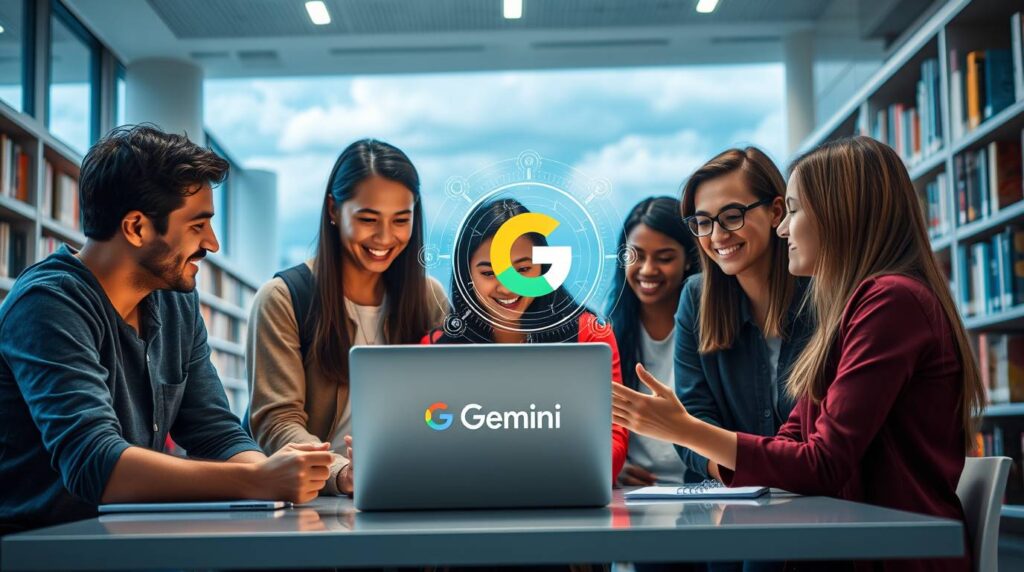Feeling overwhelmed by your next research paper? You’re not alone. Sifting through endless academic journals, crafting a strong thesis, and synthesizing information takes time. Fortunately, a new class of free AI research tools for students is changing the game. Among them, Google Gemini stands out as a powerful and accessible assistant.
This guide will show you exactly how to use Gemini to streamline your workflow. We’ll move beyond simple queries. Instead, you’ll learn practical strategies to research smarter, not harder. Let’s unlock the potential of AI for academic success.
Why Students Should Use Free AI Research Tools
First, let’s address the big question: why use AI at all? Think of tools like Gemini not as a shortcut, but as a powerful multiplier for your own intellect. For example, these tools can tackle tedious tasks in seconds. Therefore, you can focus your energy on critical thinking and analysis.
Moreover, they provide a fantastic opportunity to overcome writer’s block. They can help you brainstorm angles for a paper you’re stuck on. Ultimately, using AI for academic writing responsibly can elevate the quality of your work while saving you precious hours.
Getting Started with Google Gemini
Getting started is incredibly simple. Furthermore, it’s completely free.
- Access the Tool: Navigate to the Gemini website (formerly Bard) on your browser. You just need a standard Google account.
- Craft Your First Prompt: This is where the magic happens. A “prompt” is simply the instruction or question you give the AI. The more specific you are, the better your results will be.
For instance, instead of typing “Tell me about climate change,” a student might try: “Provide a concise summary of the three main economic arguments for carbon pricing legislation, suitable for an undergraduate economics paper.”
Notice the difference? The second prompt is precise, defines the scope, and identifies the audience.
Powerful Prompts: A Student’s Best Friend
Mastering prompts is the key to unlocking Gemini’s full potential. Here are actionable prompts you can use today.
Brainstorming and Outlining with Free AI Research Tools
Staring at a blank page is the worst. Use Gemini to generate momentum.
- Prompt: “Generate five potential thesis statements for a paper examining the social impact of TikTok on Gen Z communication.”
- Prompt: “Create a detailed outline for a 1500-word essay on the causes of the French Revolution. Include sections for introduction, three main arguments, and a conclusion.”
Research and Summarization
Gemini can digest complex information and present the key points.
- Prompt: “Summarize the key findings and methodology from this PDF article [paste text or main points] in three bullet points.”
- Prompt: “Compare and contrast the theories of Keynesian economics and Monetarism in a simple table format.”
Drafting and Editing Assistance
Improve your writing’s clarity and flow without switching tools.
- Prompt: “Suggest three alternative ways to phrase this sentence for better academic tone: ‘[Paste your sentence]'”
- Prompt: “Identify any logical fallacies or weak evidence in the following paragraph: ‘[Paste your paragraph]'”
To illustrate its utility, here’s a table of common student use cases and effective prompts:
| Student Task | Gemini Prompt Example |
| Understanding Complex Topics | “Explain the concept of quantum entanglement like I’m a high school student. Use a simple analogy.” |
| Source Evaluation | “List five critical questions I should ask to determine the credibility of an online news source.” |
| Citation Help | “Format the following book title and author in APA 7th edition: [Book Title] by [Author Name].” |
| Studying for Exams | “Generate a set of 10 flashcards with questions and answers on the major themes of Shakespeare’s Macbeth.” |
Gemini vs. Other Popular AI Tools for Students
Gemini isn’t the only option. Here’s a quick comparison of popular AI tools for studying to help you choose.
- ChatGPT (Free Version): A very capable all-rounder. However, its free version may not access real-time internet information as seamlessly as Gemini can.
- Microsoft Copilot: Excellent because it cites its sources, which is crucial for academic integrity. It’s powered by a version of OpenAI’s technology.
- Elicit.org: A specialized “AI research assistant” designed specifically for finding and summarizing academic papers. It’s fantastic for deep literature reviews.
Your best bet is to experiment. Different tools may excel at different tasks.
Using AI Ethically and Effectively
This is the most important section. AI is an assistant, not an author.
- Never Plagiarize: Do not copy and paste AI-generated text and submit it as your own work. This is academic dishonesty.
- Always Verify: AI can sometimes “hallucinate” or present inaccurate information. Fact-check all facts, dates, and references it provides.
- Use It for Ideation, Not Substitution: Let Gemini spark ideas and organize thoughts. However, the final analysis, argument, and writing voice must be your own.
Think of it as the world’s most efficient research partner. It fetches information and suggests structures, but you are the director of the final project.
Conclusion: Empower Your Learning Journey
Google Gemini is a game-changing ally for students. It democratizes access to information and helps you manage the overwhelming parts of research. By leveraging its power for brainstorming, summarizing, and editing, you can produce higher-quality work with less stress.
Remember, the goal is to enhance your critical thinking, not replace it. Use these free AI tools for student research wisely, ethically, and strategically.
Ready to transform your research process? Head to Gemini and try the prompts in this tutorial today!
Frequently Asked Questions (FAQ)
1. Is Google Gemini truly free for students to use?
Yes, the standard version of Google Gemini is completely free to use. You only need a personal Google account to access it.
2. Can Google Gemini find and cite academic sources for me?
Gemini can suggest academic topics and sometimes find relevant information. However, you must always verify the sources it mentions. For dedicated source-finding, use tools like Google Scholar or your university’s library database.
3. Will my professor know if I use AI for my research?
Your professor might suspect AI use if your writing style suddenly changes or lacks your usual voice. Furthermore, many universities now use AI-detection software. The safest strategy is to use AI as a brainstorming and editing aid, not a text generator.
4. How does Gemini compare to ChatGPT for research?
Both are powerful. Gemini often has stronger integration with Google’s search ecosystem for real-time information. ChatGPT is a versatile conversationalist. Many students use both for different tasks within their workflow.
5. What are the biggest mistakes students make with AI tools?
The biggest mistakes are plagiarizing AI content and trusting its output without verification. Always treat AI as a starting point, not a final source. Your own critical analysis remains irreplaceable.
👉For more AI Tools –> Click here!




